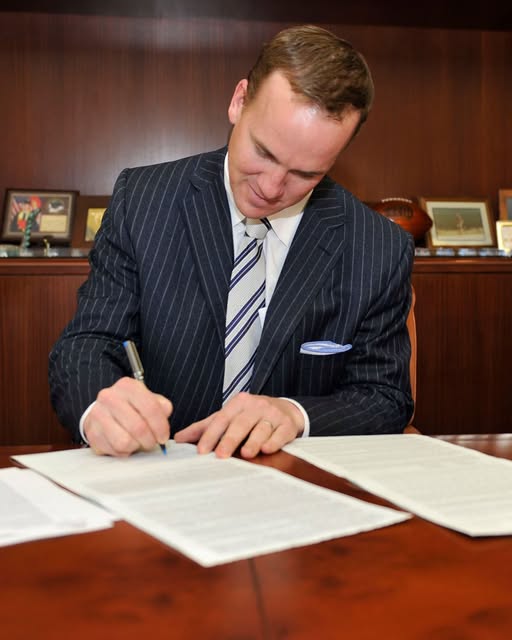On this day 13 years ago, Peyton Manning became a Bronco. The rest, as they say, is history. It was the dawn of a new era in Denver, one marked by hope, ambition, and an unyielding desire to reclaim glory. For the Broncos and their passionate fanbase, Manning’s arrival was nothing short of transformative—a seismic shift in the NFL landscape that would etch itself into football lore.
Manning’s career up to that point had already been the stuff of legends. A prodigious talent from the start, he had become synonymous with the Indianapolis Colts, leading them to a Super Bowl victory and countless playoff appearances. His arm was precise, his mind sharp, and his leadership unparalleled. Yet, when neck surgery threatened to derail his career, the Colts made the heart-wrenching decision to part ways with their franchise quarterback. In that moment of uncertainty, Denver saw opportunity.
John Elway, himself a quarterback icon and now the Broncos’ executive vice president of football operations, made his move. With the swagger and conviction that had defined his own playing days, Elway set out to bring Manning to Mile High. The process was grueling, a relentless pursuit that culminated in Manning donning the orange and blue. In that moment, the Broncos’ fortunes changed.
Expectations were sky-high. Broncos fans, still reeling from the Tebowmania of the previous season, knew they were on the cusp of something extraordinary. Manning, with his meticulous preparation and insatiable drive, set out to justify the hype. What followed was a whirlwind of success and redemption. The Broncos became an offensive juggernaut, shattering records and laying waste to defenses across the league. Manning was the maestro, orchestrating an aerial assault that left opponents grasping at straws.
During the 2013 season, Manning put forth one of the greatest quarterback performances of all time. His 55 touchdown passes and 5,477 passing yards set new NFL records—marks that still stand as a testament to his brilliance. Under his guidance, Denver posted a 13-3 record and stormed through the AFC playoffs. The journey culminated in Super Bowl XLVIII, a game that ended in heartbreak as the Seattle Seahawks dismantled the Broncos 43-8. It was a humbling moment, but Manning remained resolute.
For lesser men, that defeat might have signaled the beginning of the end. But not for Manning. He returned the following season, older and wiser, determined to conquer the league once more. Though the Broncos fell short in the playoffs, the foundation was set. Manning’s presence had redefined the culture—one built on precision, discipline, and a relentless pursuit of excellence.
The 2015 season proved to be Manning’s swan song, though it was far from a graceful exit. Injuries took their toll, and his once-peerless arm strength faded. Yet, when called upon in the playoffs, Manning answered the bell. He guided the Broncos through a gauntlet of formidable foes, leaning on a dominant defense led by Von Miller and DeMarcus Ware. Super Bowl 50 became a testament to resilience and grit. Though Manning was not his vintage self, his leadership and poise anchored the team. When the final whistle blew and Denver stood victorious over the Carolina Panthers, the circle was complete.
In four years with the Broncos, Manning transformed the franchise from mediocrity to mastery. He left Denver as a Super Bowl champion, a league MVP, and an icon who inspired an entire generation of quarterbacks. His legacy is woven into the fabric of the franchise, a reminder of what is possible when preparation meets opportunity.
Thirteen years later, the echoes of Manning’s greatness still resonate through the halls of Mile High. The Broncos have yet to find another quarterback who could fill his shoes, but his impact lingers—an enduring symbol of what it means to strive for greatness despite the odds. For fans, his arrival remains one of the most pivotal moments in modern NFL history. The memories are indelible, and the gratitude everlasting.
Today, as fans reflect on that momentous day, they are reminded not just of the championships and accolades, but of the unwavering commitment to excellence that defined Manning’s tenure. He did not just play quarterback—he redefined it. He did not just lead a team—he transformed a franchise. And as time goes on, the legend of Peyton Manning, the Bronco, only grows more profound, more cherished, and more revered.



